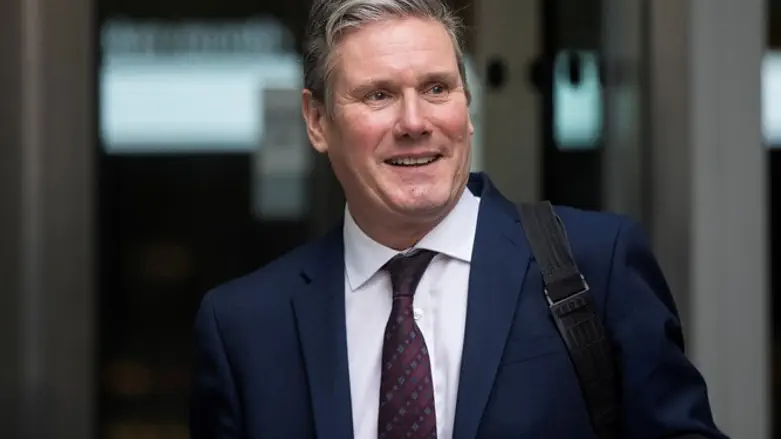
Pro-European centrist Keir Starmer was unveiled as new Labour party leader on Saturday, heralding a shift in Britain's main opposition party after a crushing election defeat under veteran socialist Jeremy Corbyn and years of ideological infighting.
The 57-year-old former chief state prosecutor defeated Corbyn loyalist Rebecca Long-Bailey and backbencher Lisa Nandy in a lengthy campaign sparked by Corbyn's resignation after December's loss at the polls to Boris Johnson's Conservatives.
Angela Rayner becomes the new deputy leader, Labour announced on Twitter, after it was forced to cancel a special conference because of the coronavirus outbreak.
Starmer, who was Labour's Brexit spokesman, called his election "the honor and privilege" of his life and vowed to "engage constructively" with Johnson's Conservative government.
Johnson immediately offered his congratulations and the pair spoke, with Starmer accepting an invitation to a government briefing on COVID-19 next week.
"Keir offered to work constructively with the government on how best to respond to the coronavirus outbreak," his spokesman said.
Starmer himself vowed to reunite Labour, after deep rifts between supporters of socialist Corbyn's hard-left ideals and centrists, and wrangling over its Brexit strategy.
He immediately addressed the issue of anti-Semitism that Corbyn was accused of failing to tackle, which tarnished the party's reputation and caused Jewish members to leave in droves.
"Anti-Semitism has been a stain on our party. I have seen the grief that it's brought to so many Jewish communities," Starmer said.
"On behalf of the Labour Party, I am sorry. And I will tear out this poison by its roots and judge success by the return of Jewish members and those who felt that they could no longer support us."
Starmer, who won a resounding 56.2 percent of the vote of Labour members, acknowledged the party had "a mountain to climb", after four straight general election defeats -- two under Corbyn.
But he vowed: "We will climb it."
He added: "I will lead this great party into a new era, with confidence and with hope. So that when the time comes, we can serve our country again in government."
Labour grew out of the trade union movement but moved to the political center under former prime minister Tony Blair, who was in office between 1997 and 2007.
Corbyn spent a lifetime on the sidelines because of his left-wing views, and his election as leader in 2015, on the back of a huge surge in party membership, was a shock.
MPs and party members have been locked in an ideological battle ever since.
"There's really a lot of bad blood and mistrust," said Steven Fielding, a political expert at the University of Nottingham. "The first challenge (for the new leader) will be to put a team together that at least looks like it has the ability to unify the party."
Winning back voters who defected to the Conservatives is also top of Starmer's "to do" list if Labour is to have any hope of victory at the next election, currently scheduled for 2024.
Brexit was a toxic issue for the party, torn between euroskeptic supporters in many northern English towns and pro-EU voters in the big cities such as London.
Starmer was opposed to Brexit and played a key role in moving Labour to support a second referendum on leaving the European Union.
However, voters were not convinced and Johnson took Britain out of the bloc on January 31.
The coronavirus outbreak has brought a more immediate challenge.
Johnson's government has imposed draconian curbs on public movement to try to stop the spread -- measures backed by Labour, although it successfully pressed for more parliamentary scrutiny of new police powers.
The Conservatives have also promised eye-watering sums to keep businesses and individuals afloat, wading into traditional Labour territory.
In response, Johnson's popularity ratings have shot up.
A YouGov survey last week found that 55 percent of the public had a favorable opinion of him, up from 43 percent a week earlier.
Some 72 percent thought the government was doing well -- including a majority of Labour voters.
Ministers have been on the back foot in recent days, however, over the lack of testing for coronavirus and protective equipment for healthcare staff.
Labour has been pressing the issues and Starmer said this would continue.
"My instinct will be to be constructive but to ask the difficult questions," he told a Guardian podcast this week.
Israeli Foreign Minister Yisrael Katz (Likud) on Saturday congratulated Keir Starmer on being chosen to lead the British Labour party.
"I congratulate Keir Starmer on being chosen as the leader of the Labour party in Britain," he said. "I hope that he will keep his promise to fight the anti-Semitism which has grown in his party during recent years, and that like Labour leaders of the past, he will strengthen the friendship between Britain and Israel."